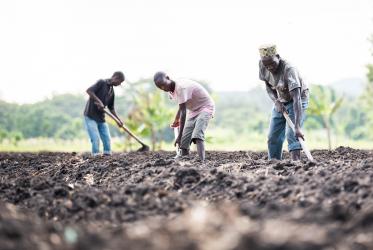Defend the oppressed. Take up the cause of the fatherless; plead the case of the widow. (Isaiah 1:17)
A 5-day training programme updated and equipped 29 youth (14 women and 15 men) from 13 countries in Asia, Africa, the Caribbean and Pacific with the latest information and experiences on key existential issues and how advocacy is conducted, rooted in the Christian faith, in working for justice and peace in communities.
The training - “Congregation based Advocacy: Walk the Talk” was co-facilitated by the World Council of Churches (WCC) Ecumenical Advocacy Alliance, Council for World Mission and the Pacific Conference of Churches. It was held in late August at the Jovili Centre of the Pacific Theological College, in Suva, Fiji.
“We gained understanding on advocacy, from the Christian perspective and practical knowledge on how to do advocacy in key domains of action, in the context of the sustainable development goals,” said Temukisa Kanesha Tuliaupupu from Samoa.
Christopher Latchman from Guyana, said, “It is clear that nothing can and should prevent people and creation from always experiencing the love of God! As youth from around the world we are motivated to advocate and act, for the love of God to be experienced by all and for the rights and dignity of all.”
“Each day, by creatively engaging in group work through drama, poetry and practical action, we put the issues we learned from each other and the resource persons into action. We are deeply motivated to make justice and peace a reality. We will walk the talk!” affirmed Waqavonovono Peter from Fiji.
Dr Manoj Kurian, coordinator of the WCC Ecumenical Advocacy Alliance, said: “The youth brought in critical experiences from their own lives and communities, which greatly enriched the collective learning process. They were also equipped with resource material and we have created a learning platform for them to share and receive continuing accompaniment to develop and implement specific advocacy plans, back in their own contexts.”








